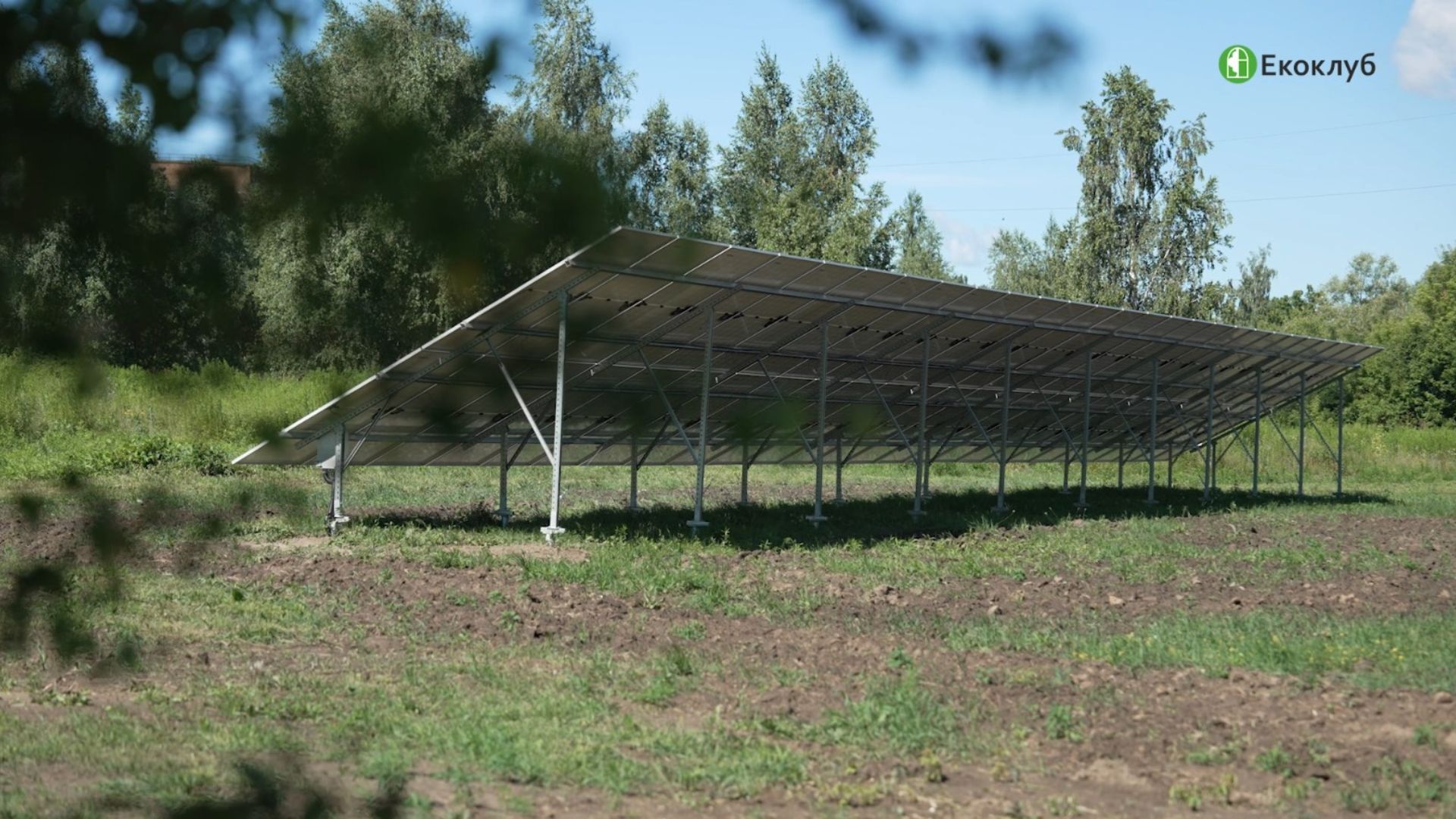Continued attacks on Ukraine’s energy infrastructure are endangering the lives of communities. Without a stable power supply, the equipment necessary for operating water utilities will fail, leaving Ukrainians without water supply and sewage services. In response, the Sumy community is prioritizing energy security by installing solar power plants during the war.
One such plant has been operational at a water intake facility for over two months. This solar power installation consists of panels with a capacity of 100.57 kW and batteries with a capacity of 81.6 kWh. The batteries store excess electricity, ensuring the water utility can continue supplying water to consumers even during emergencies. For instance, during a recent blackout, the water utility remained operational for more than four hours.
The community received funding for the installation of the solar power plant from an international humanitarian organization. In just two months of operation, the station has saved approximately 140,000 hryvnias, which can now be allocated to other energy-efficient projects.
Artem Kuznetsov, the First Deputy Mayor, and Oleksii Zhukov, the Chief Engineer of the Miskvodokanal utility company, talked about the experience, results, and significance of solar power plants for ensuring a sustainable energy supply in the community.
– Artem, why did the community decide to develop renewable energy sources (RES)? What was the need?
The Sumy community, like other frontline areas, is in dire need of renewable energy development. The war has caused severe damage to infrastructure and energy facilities, necessitating a rapid and sustainable restoration of the energy system. Therefore, developing decentralized renewable energy sources is primarily about ensuring the safety of our residents and quickly responding to challenges.
We continue to move towards sustainable development because the environment remains important, even in times of war. Since 2015, the Sumy community has been a signatory to the European Commission’s Covenant of Mayors initiative. Last year, we renewed our commitment by joining the Covenant of Mayors for Climate and Energy initiative, aiming to reduce greenhouse gas emissions by at least 35% by 2030.
Our measures include improving the energy efficiency of buildings and developing renewable energy sources. These actions will reduce our dependence on fossil fuels and enhance the quality of social and communal services.
– What is the community’s experience in implementing RES projects?
In 2023, the community implemented three projects to install solar power plants (SPPs) in public institutions with grant funds and support from Ecoclub:
A 60 kW solar power plant was installed on the roof of the city clinical hospital and launched in June 2023. The installation was funded through Ecoclub’s fundraising campaign, with additional financing from the community budget.

A 7 kW solar power plant to heat a greenhouse in the botanical garden as part of a grant competition by the Ecoclub and Ecoaction (supported by the European Union).

A 60 kW solar power plant for a children’s hospital. It was installed with grant funds from the Deutsche Gesellschaft für Internationale Zusammenarbeit (GIZ). The station was launched in December 2023, and the community budget was used to purchase batteries that ensure the operation of the infectious diseases department at night.
Stable and high-quality utilities for the community residents are a priority for us. In 2024, enemy shelling became more frequent, disrupting the stable power supply to critical infrastructure. To address this problem, we collaborated with EcoClub to install a solar power plant at one of the Miskvodokanal utility’s water intakes. This station is now operational, ensuring water supply during outages.
– How has the community’s critical infrastructure been performing over the past three months? Have you suffered from power outages or faced any critical situations?
Over the past three months, critical infrastructure has been operating stably, without significant power outages. However, on the night of March 6, enemy air strikes targeted the region’s power supply facilities, resulting in a prolonged power outage, particularly at water supply facilities. Thanks to the solar station installed at the water intake, the company managed to operate for an additional 1.5-2 hours during the outage. We are grateful for the well-coordinated work of the power engineers who quickly restored the power supply.
– What RES and energy efficiency projects does the community plan to implement in the near future?
Solar power plants have proven effective in critical situations. We anticipate that the enemy will continue to target electrical substations this heating season to leave the community without a stable power supply. Therefore, we are seeking funds and partners for new renewable energy projects. Specifically, we aim to equip other water utility facilities and medical institutions in the community with solar power plants.
– Do you plan to expand the existing solar power plant? What capacity does the water utility need to cover the water needs of the entire community?
We have preliminarily calculated that to ensure the stable operation of three water intakes and treatment facilities, the required capacity of the solar power plant is 1.3 MW. We are actively seeking funding sources and partners to equip social facilities with solar panels.
– What are the main obstacles (technical and organizational) to the implementation of SPPs that you have encountered? How did you manage to overcome them?
One significant obstacle was the delay in payment from the State Treasury of Ukraine due to bureaucratic procedures. We quickly resolved this issue through the coordinated efforts of specialists from the Department of Finance and the Department of Infrastructure of the city.
– Do the actual results of the SPP meet the expectations?
The generation of solar electricity aligns with the preliminary calculations made by our experts. Given the increased solar activity and climate change in the region, the prospects for solar energy development are promising.
– What are your recommendations and tips for more efficient operation of solar power plants?
Our advice is as follows:
1. Choose a qualified team to implement the project.
2. Carefully select a location for installing the panels, considering the orientation of the site relative to the cardinal points.
3. Prepare high-quality terms of reference and requirements for the work to be performed to select contractors.
4. When preparing tender documents, pay attention to the quality of materials and equipment.
– Oleksiy, how did the water utility operate during power outages before the SPP was installed? Did you manage to supply water to the population?
Before the installation of the SPP, the water utility relied on diesel generators to operate during power outages, which provided power for a limited time. However, this approach was not sustainable. Generators consume a significant amount of expensive fuel, purchased at the expense of taxpayers. Instead, we opted for a more sustainable solution: installing solar power plants. These plants can operate for about 20 years, are easy to scale, and require minimal maintenance.
– What is the capacity of the installed solar power plant?
The installed solar power plant consists of 100.57 kW panels and 81.6 kWh batteries.
– How much electricity did you save thanks to the SPP?
From May 1 to July 8, the SPP generated 25.32 MWh of electricity, saving over UAH 210,000. We anticipate continued savings on energy bills, allowing us to implement other projects to improve service delivery.
– How has the water utility’s work changed after the SPP connection?
Recently, during a blackout, the SPP ensured the water utility’s operation at night for about two hours. During the day, thanks to the batteries, one well operated for about four hours. The staff continued to fill the reservoir with clean water and distribute it to residents.
– How long can the water utility provide water to the population during power outages thanks to the SPP?
The hybrid part of the SPP allows one well to operate during daylight hours and for 1.5 hours at night. Residents who have experienced the benefits of a stable water supply are satisfied and feel more secure.
– What were the main obstacles (technical and organizational) during the project implementation? How did you manage to overcome them?
One major challenge was the multi-level approval system for co-financing the project, which required additional time and effort. Additionally, long delivery times for foreign equipment complicated the process.
The prompt technical and legal support from Ecoclub’s experts, the organizational skills of the Department of Finance, Economics, and Investment of the Sumy Community, and the high level of technical knowledge of Sumy Vodokanal’s specialists helped overcome these challenges. The availability of equipment stocks and the practical experience of the construction contractor also significantly contributed to resolving the issues.











